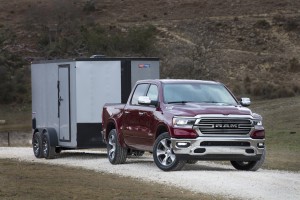
New vehicle sales are expected to take another massive hit in April, but truck sales are stronger than expected.
There is no question that the U.S. new car market has been hammered by the coronavirus pandemic – demand sliding nearly 100% this past week in hard-hit cities like New York and Detroit – though demand, nationwide, did not tumble quite as badly as had been forecast this past week.
Demand has been widely expected to fall about 80% this month after tumbling about 40% in March but the downturn was closer to just 60% last week, according to J.D. Power using data collected directly from thousands of American dealers. Heavy use of incentives, especially for profitable pickups, helped prop up demand in some parts of the country, notably Dallas, according to the research firm.
But that doesn’t mean there’s reason to be optimistic, added Tyson Jominy, the head of Power’s PIN network which collects the dealer data. If anything, he said during a Wednesday media webcast,
Sunday sales were off 84%” on a national basis, “the worst daily sales we have seen” since the pandemic reached the U.S.
(Toyota extends shutdown while Tesla, Nissan and others launch unpaid furloughs.)
As they have during the past month, pickups remained the one real bright spot in the U.S. market, demand falling off far more slowly than for other segments. Luxury sales were particularly hard hit, as most customers lease and have been extending their agreements in large numbers.
Pickups have been propped up by incentives that climbed to a record $7,300 last week, noted Jominy, adding that givebacks overall are at record levels. The increasingly common 0% loans are saving truck buyers an average of nearly $90 a month, according to Power. In turn, buyers are opting up, with average transaction prices on new vehicles climbing to a record $36,300 last week, about $2,300 more than in February.
The surge in pickup demand again played out well for Detroit automakers who, collectively, are now holding a more than 50% share of the U.S. new vehicle market for the first time in a decade.
The slightly better-than-expected sales last week may have been boosted by the growing number of dealers who are now using online sales. Authorities in several states where dealership have been ordered to lock down are considering allowing online sales in the coming days, according to Power.
Even the rare good news was tempered by reality, however, Jominy telling his media audience that sales of “pickups ended the week much lower than they began.”
(Pandemic will have “a permanent effect” on auto industry.)
Looking forward, there are few signs that things are going to get better fast, Jominy’s colleague, Power Chief Data Officer Thomas King predicting sales will remain severely depressed well into mid-2020. “We are looking at a very, very challenging outlook for the year.”
It’s not just the new car market getting hammered. If anything, used car sales took an even sharper tumble last week. That suggests that the big incentives on pickups and other new vehicles have lured in many of those used car buyers that are currently in the market.
One of the challenges is an ongoing collapse in trade-in values. The average equity on a used vehicle has fallen from $5,839 in February to just $2,879, partially offsetting the big incentives, noted King.
Dealers simply don’t have the cash to play with as their sales tumble and U.S. auction markets grind to a halt. Where those auctions typically move more than 100,000 used vehicles a week, Power data found that has fallen to around 15,000.
“The auctions are not functioning in any sense of the word,” said King.
The collapse of the U.S. automotive market, along with the shutdown of North American production, has had a massive impact on the American economy since about 10 million Americans are dependent upon the industry in one form or another, said Doug Betts, president of Power’s Automotive Division, with auto production typically pumping about $11 billion a week into the economy.
(Car dealers struggling to cope with coronavirus turn to online, “touches” car sales.)
A number of automakers, including Toyota, Honda and Fiat Chrysler, have laid out plans to resume production by early May. But the resumption of production already has been delayed twice. And there are numerous challenges remaining, said Betts, including the task of getting industry suppliers reopened so there parts for the 53 assembly plants scattered across the United States.
